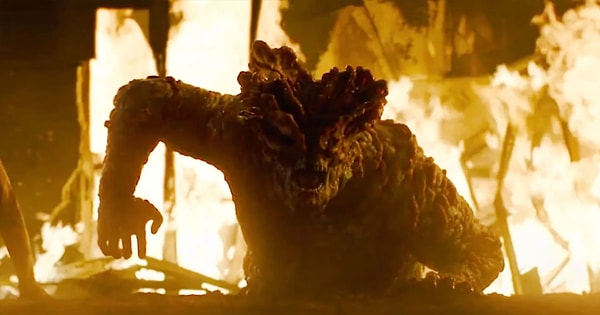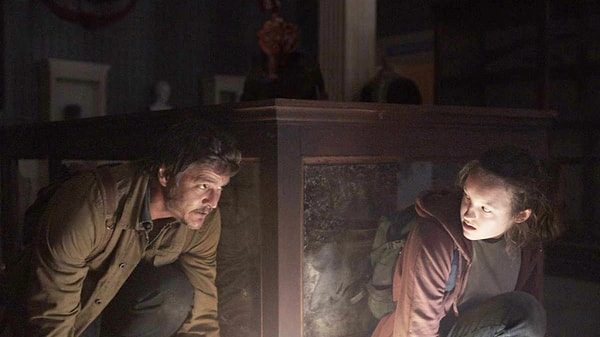The Last of Us: In Our Darkest Hour
It's a wonder that the humanity has survived for so long. Nature is a harsh and unforgiving place, perpetually pulling us closer to death. The only way to live is to fight, keep moving, keep pushing, and always stay prepared. Even then there are surprises--a treasure trove of horrifying curiosities, predators, toxins, and things that go bump in the night. For most of our history, we'd last three, maybe four decades before succumbing to sickness and infection. A simple scratch could cut our lives short. But that was a long time ago, and things have changed quite a bit since then. We have modern infrastructure, water, and electric. Getting water is as simple as turning a knob. There's a vast network of retail stores where we can purchase everything we need. We don't have to work, and we don't have to worry. Everything has been simplified for us. It's hard to imagine going back to a time when we had to struggle just to have enough food to survive.
In a sense, the post-apocalyptic genre was built to remind us how vulnerable we are. A tiny shift in the ecosystem, a single bug, or a rise in temperature could send all of that crashing down--and it likely will, because nature hasn't changed. It's just as terrifying as ever, and we've grown dependent on civilization. We don't know how to grow our own food or raise and slaughter animals. Many of us can barely use a stove. If all of those things were taken away from us, we'd die by the millions.
We should learn how to take care of ourselves without grocery stores and electricity, and the best way to do that is to get scared. We have to see what can happen when we're all on our own, fighting for the bare necessities. That's why franchises like 'The Last of Us' are so important. They use horror to connect us to our roots. You just need a really good concept, something believable and frightening. Cordyceps was perfect. The fungus is a real-life entity, often used in food, as a medication, or as a health supplement. It implants itself in an insect, takes control of its brain, and eventually grows large enough to pierce through its exoskeleton. It'll lead an ant along like a puppet before bursting out of its head and taking root.
What Really Matters
Cordyceps comes with more questions than answers, each more intriguing than the next. What drives it? When it takes control of something, how does it make decisions? Is there an instinct? What if it were to take control of a human? Is it intelligent? Does it seek out flesh? The fungus doesn't just take root in a body. It spreads tendrils, building a vast network capable of transmitting messages from miles around. Does that mean it's a part of a single collective consciousness? There must be something deeper beyond simple animal urges. The infected seem to move with a purpose, seeking out healthy humans. When their mind is gone, it's still using what senses it has left. At certain stages infected can see, hear, smell, and touch. There must be something pulling the strings.
None of this matters, of course. 'The Last of Us' isn't about fungus. It's about what that fungus did to humanity. It's our fault. We allowed our climate to change, filling our air with poison. We should've known better. We should've done something, but we didn't, and new enemies mutated to survive in the environment we created. Almost as soon as the fungus mutated we were overwhelmed. Cities fell. Governments collapsed, and the healthy were slaughtered out of fear of infection. Our beloved infrastructure fell instantaneously, robbing us of the bare necessities we would need to live. We couldn't just go to the store or flip a switch. That simple life was gone, and democracy was gone with it. The military went from neighborhood to neighborhood with the promise of safety in quarantine zones. They rounded up as many as they could and killed the rest, even going so far as to bomb entire regions. The quarantine zones evolved into military dictatorships, no better than prison camps where a single misstep could lead to public execution. Nobody could leave. There was no chance of class mobility or a better life, just cruelty, harsh labor, and men with guns all around.
If you were unlucky enough to live outside the quarantine zones, then you wouldn't survive for long. Without widespread police patrols, chaos was able to take hold, and people did what they had to do to survive. Groups of slavers would roam the countryside, hunting down anyone who could work while raiders spent their time ransacking settlements. If you had a stockpile or a place of your own, they were an eventuality. People couldn't just set down roots. There were too many violent, desperate men who wanted more. That was on top of the massive armies of infected, all a part of a massive mycelial network. Stepping past one could alert a thousand fifty miles away, which meant that moving around was too much of a risk.

Courtesy of HBOMax
In many ways, 'The Last of Us' depicts your stereotypical zombie apocalypse. There's hordes of mindless monsters. Anarchy reigns supreme, and most people have to fight to survive. But the world is very different from that of 'The Walking Dead' and other franchises within the genre. When the fungus took hold, governments around the world responded as best as they could. They consulted with medical professionals and experts. They found ways to salvage themselves and enact emergency measures, and they did survive in some form. There's a system setup to shelter the public, feed them, and keep them safe. Civilization hasn't completely vanished. Nobody is starting from square one. They're just trying to survive the harsh environment.
With that system came schooling, employment, a justice system, technology, and resources. There was water, electricity, medicine, and radios, as well as weapons and a black market that could compensate for anything the military dictatorships couldn't provide. This is more than most survivors of a zombie apocalypse could ever dream of. They had to come together, find new ways to protect themselves, and build new governments, and the results were quite messy. The world of 'The Last of Us' is ruled by extremists with guns, but all of the ingredients for civilization are right there. If humans somehow found a way to become immune, they'd already have everything they needed to begin expanding and rebuilding. They might have to overthrow the military, but eventually, things would go back to the way they once were.

Courtesy of HBOMax
Final Destination
Cordyceps didn't just attack humanity. It dragged giant steel and glass skyscrapers to the ground. It uprooted roads. It plastered every surface with the decaying remains of its victims. There was centuries' worth of damage within two decades, and it just kept spreading. The reason quarantine zones were built was to keep the fungus from attacking humans. Without its favorite food, it would theoretically die off, and eventually, humanity would find a way to rebuild. But the government wasn't able to round everyone up. There were still thriving populations on the outside, enough for cordyceps to spread indefinitely, and some infected lived for decades. They spent 20 years moving through the landscape, spreading spores and infecting every healthy human they could find.
Humanity was told that there was no cure for cordyceps. The only solution was to kill anyone who became infected. So people lived on borrowed time, either slaving under the weight of their military dictatorships or fighting for their lives on the outside. Eventually, everyone would be overwhelmed by the hordes of mindless monsters, and humanity would be subject to the whims of a spore.
More often than not, that's all that people can hope for in this genre--a moment of safety, an electric fence to hold back the monsters, or a set of well-placed traps. But 'The Last of Us' gave us more. From the moment we're introduced to that world, we see that things have gone wrong. Civilization has been torn apart. We were on the brink of extinction, but someone somewhere held the key to humanity's survival. It's a story of hope in our darkest hour.
Keşfet ile ziyaret ettiğin tüm kategorileri tek akışta gör!

Send Comment